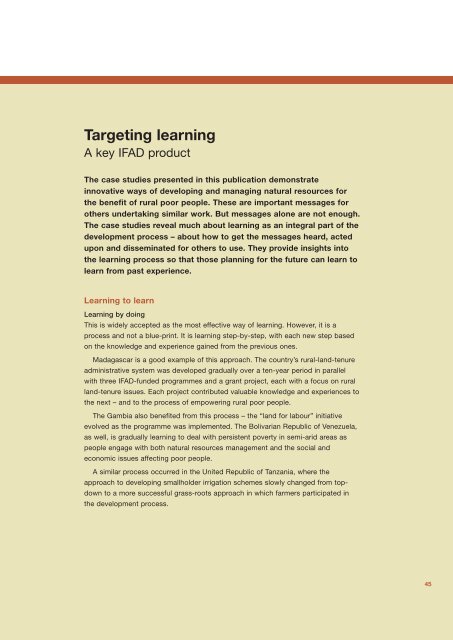Community-based natural resource management - International ...
Community-based natural resource management - International ...
Community-based natural resource management - International ...
Create successful ePaper yourself
Turn your PDF publications into a flip-book with our unique Google optimized e-Paper software.
Targeting learning<br />
A key IFAD product<br />
The case studies presented in this publication demonstrate<br />
innovative ways of developing and managing <strong>natural</strong> <strong>resource</strong>s for<br />
the benefit of rural poor people. These are important messages for<br />
others undertaking similar work. But messages alone are not enough.<br />
The case studies reveal much about learning as an integral part of the<br />
development process – about how to get the messages heard, acted<br />
upon and disseminated for others to use. They provide insights into<br />
the learning process so that those planning for the future can learn to<br />
learn from past experience.<br />
Learning to learn<br />
Learning by doing<br />
This is widely accepted as the most effective way of learning. However, it is a<br />
process and not a blue-print. It is learning step-by-step, with each new step <strong>based</strong><br />
on the knowledge and experience gained from the previous ones.<br />
Madagascar is a good example of this approach. The country’s rural-land-tenure<br />
administrative system was developed gradually over a ten-year period in parallel<br />
with three IFAD-funded programmes and a grant project, each with a focus on rural<br />
land-tenure issues. Each project contributed valuable knowledge and experiences to<br />
the next – and to the process of empowering rural poor people.<br />
The Gambia also benefited from this process – the “land for labour” initiative<br />
evolved as the programme was implemented. The Bolivarian Republic of Venezuela,<br />
as well, is gradually learning to deal with persistent poverty in semi-arid areas as<br />
people engage with both <strong>natural</strong> <strong>resource</strong>s <strong>management</strong> and the social and<br />
economic issues affecting poor people.<br />
A similar process occurred in the United Republic of Tanzania, where the<br />
approach to developing smallholder irrigation schemes slowly changed from topdown<br />
to a more successful grass-roots approach in which farmers participated in<br />
the development process.<br />
45

















